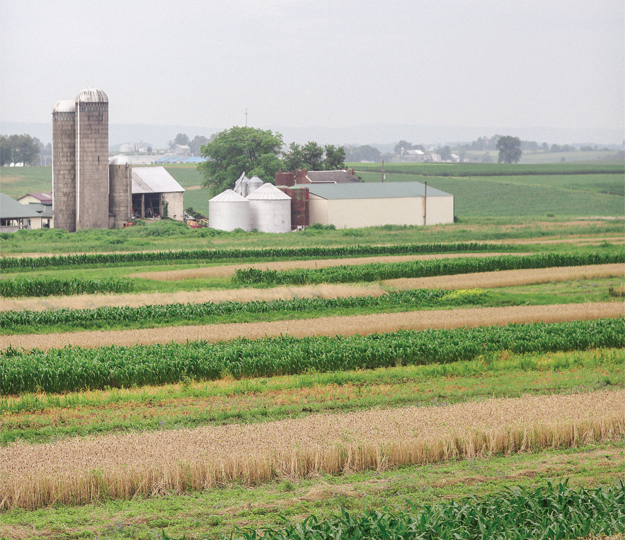
The Rodale Institute is a quiet gem tucked into 333 acres of farmland in Kutztown. Working off the general public's radar for decades, the Institute lays claim to being the birthplace of the organic movement in America and has had a global impact on human and environmental health.
“We have been primarily focused on research for decades,” says “Coach” Mark Smallwood, executive director of the Rodale Institute. More recently, the Rodale Institute's position has been that in order to have the biggest national impact, they must start locally. This has led to various local initiatives and educational platforms, including the Organic Allentown program founded in 2013. “It's not until the past few years that we have developed a community presence. We've been here a long time, but we're just emerging in the community.”
The Rodale Institute was founded in 1947 as the non-profit Soil Health Institute by J.I. Rodale, who also founded Rodale Inc., one of the largest independent publishing companies in the country that publishes popular titles such as Organic Life (formerly Organic Gardening), Prevention, Men's Health and Runner's World. The Rodale family has remained actively involved with both organizations. But despite sharing a name and a passion for health, the two organizations remain separate and unique.
“J.I. Rodale connected the idea of healthy soil to healthy food, to healthy people,” says Smallwood, who noted that the term “organic farming” was popularized by Rodale in our own backyard.
“Our impact on the environment began with agriculture. Civilization began with agriculture. It's the quintessential relationship between humans and the earth. There's no perfect way to do it, but we can constantly improve,” says Smallwood. “For the consumer, ‘organic' is the most trustworthy label that exists. It's just one choice in the grocery store, but it's a way to get involved. It's a powerful choice.”
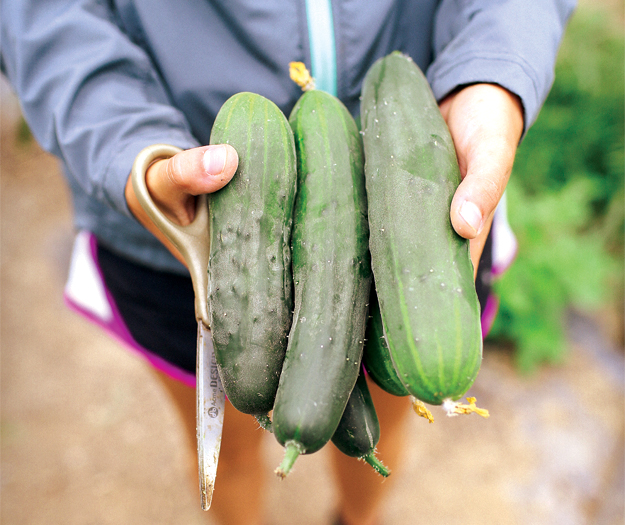
Organic Allentown
Perhaps the most visible community initiative launched by the Rodale Institute is Organic Allentown. The program has three parts: two farmers' markets in center city Allentown, urban organic gardens planted in open spaces and vacant lots and improved access to fresh organic produce in Allentown's small corner stores.
The program began by chance, when an intern at the Rodale Institute began setting up a “one-woman farmers' market” with excess produce from the organization's ASC (Agriculture Supported Communities) program, which is a spin on the traditional CSA program that allows families to buy weekly shares of vegetables directly from the farm. Excess produce was sold at a simple display and card table, but the idea caught the interest of the Institute's directors who knew there was a need for access to fresh, affordable food within the city limits.
“That presence grew, the next year, to an official Rodale Institute organic farmers' market with a few vendors, very small,” says Smallwood. “This year it is two organic farmers' markets in Allentown, with even more vendors.”
The markets are open Saturdays from June through October in the parking lot of St. Luke's Evangelical Church, 417 North 7th Street in Allentown, and at the 15th Street YWCA/YMCA in Allentown.
“It's always a challenge in the communities. There's some education that needs to happen. What is organic? Why is organic important? Why is local important? There are some behaviors that are ingrained. People are saying, ‘Organic? That's not for me,' but organic is for everyone,” says Jesse Barrett, Organic Allentown Program Manager. “We have work to do in the community to gain acceptance. We've already seen that being visible through our farmers' markets is the first step. Every week people get more used to seeing us. They might walk through one week and buy one thing. The next week they'll return and do most of their shopping.”
The Rodale Institute also received federal grant money to expand this year's program and make organic foods more affordable for low-income families. Patrons paying for their farmers' market food with SNAP benefits have financial incentives, allowing them to purchase organic food at half price. The Institute's ASC program also has financial incentives available for families paying with SNAP benefits, matching the price of each share dollar for dollar to encourage low-income families to enroll. “It's more affordable for families, but not at the cost of the farmer,” says Barrett.
While both the farmers' market and ASC program have increased urban access to fresh, organic foods, the Rodale Institute knew they'd need to expand further to have a real impact on the city.
“The idea for Organic Allentown as a city-wide initiative grew out of the second year of the market,” says Smallwood. “There was a study done by Lynn Prior, ‘Buy Fresh, Buy Local,' that established what our Lehigh Valley food system looks like.” After losing nearly half of our area's farmland to development, local residents are faced with limited access to fresh foods.
Four areas in the Lehigh Valley have been labeled “food deserts” by the USDA, having both a high poverty rate and low access to full-service grocery stores or supermarkets.
But as Prior noted in her report, local foods sold at farmers' markets are typically fresher and cost less money than those found in a full-service grocery store. This can also be applied to locally grown organic products.
“Rodale Institute focuses on making sure that when we improve food deserts, we do it using organic products. It's our position that local is very important in repairing our broken food system, but local organic trumps all,” says Smallwood.
Staff members of the Rodale Institute began brainstorming. Weekly farmers' markets are a great start, but how could they get fresh, locally grown organic food into stores where residents are shopping daily for food? And with the amount of land dedicated to farmland shrinking, how could future farmers find the space necessary to grow and harvest organic produce?
Thus began the Rodale Institute's drive to introduce local organic foods to the owners of local corner stores and bodegas. They are also building urban organic gardens and vertical growing towers both on their Kutztown farm and on two locations in Allentown: one near Trout Hall and the Lehigh Valley Heritage Museum on Walnut Street, and another near the Institute's farmers' market at the Allentown YWCA/YMCA.
These vertical growing towers have the benefit of doubling the growing space of a given plot of land. Made of compost, straw and a circular wire skeleton, growing towers can also be placed on soil that might be unfit for gardening. These towers have become a visible reminder of what Organic Allentown hopes to accomplish and are starting conversations among residents and future farmers alike.
“As we develop Organic Allentown and develop these opportunities, we'll be able to say to our ASC graduates that these opportunities are available,” said Smallwood. “This is the impact that one ASC intern had here. She put out a card table and it just grew. It's a beautiful story.”
He noted that the Institute and Allentown officials are working together to realize the large-scale vision of Organic Allentown. They're also working with officials from Housing and Urban Development, the USDA and representatives from the Mid-Atlantic SNAP regional office.
“There's still a bit of work to be done, because we do have a pretty grand vision of Organic Allentown,” said Smallwood.
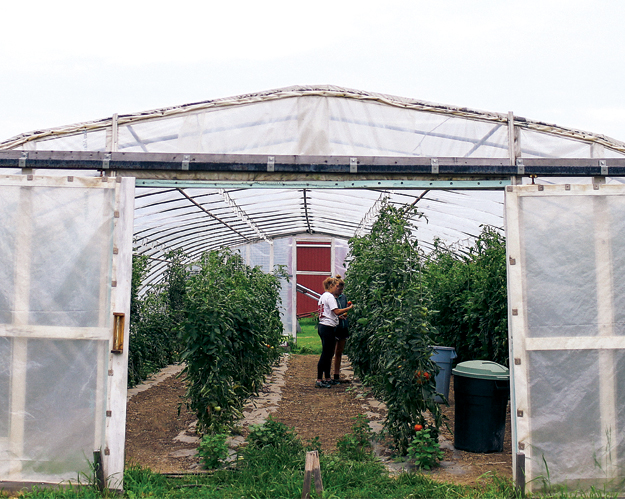
Farmer Training
While improving access to fresh, organic food is one piece of the puzzle, training tomorrow's farmers is another. The number of farmers working today is just one-third of what it was a century ago, and the USDA expects that one in four farmers will retire over the next two decades. The Rodale Institute is dedicated to sharing its research with current farmers and to opening the farm to interns and visiting farmers wishing to learn more about organic farming methods.
For those not looking to earn college credit or a formal training certificate, the Rodale Institute offers the ASC (Agriculture Supported Communities) program, an eight-month organic farming internship with hands-on training. Interns are guided as they plan, plant, manage, harvest and market produce through an entire growing season on the Kutztown farm. All proceeds are returned to the non-profit organization, helping to fund research and other expenses on the farm. Interns also engage with the community through Organic Allentown and the Allentown farmers' markets, where they are exposed to the questions, concerns and requests of local customers.
As mentioned before, the ASC program is a spin on a traditional CSA program, in which locals purchase a “share” of the farm before the growing season begins. This buy-in provides farmers with enough funds to survive planting season until crops are ready to sell. In return, CSA members receive an agreed-upon portion of the harvest, often receiving a weekly basket.
Instead of asking for funds up front, Rodale Institute's ASC program allows members to pay weekly for their portion of the harvest. The cost for a small portion is as low as $15 per week and $7.50 for families using SNAP benefits. “It's a novel way to deliver foods to an underserved community,” says Smallwood. “ASC targets local food deserts, these low-income and low-access areas, and allows them to pay by week. It's way more manageable than asking for a large payment up front.”
In addition to working with underserved communities and learning to adapt their marketing methods to difficult financial climates, ASC interns also work with Lehigh University MBA candidates to develop a business plan that they can utilize after they leave the Rodale Institute. “They may want to take the ASC model back to their community, or they might have something different in mind. We want them to leave with a strong, tangible business plan that is ready to go to the bank,” says Smallwood.
Future farmers interested in college credit or a formal certificate program can enroll in the Rodale Institute's 36-credit, one-year certificate program with Delaware Valley University focused on organic agriculture. The program utilizes two semesters in the classroom and one hands-on semester on the farm to provide students with the experience they need to start or be employed on a small-scale organic farm.
This program is open to all interested individuals but was developed with veterans in mind. While at a farming convention, Smallwood spoke with several veterans who had recently returned to the United States from overseas and were looking to find a new career path filled with enriching life instead of combat. “They wanted to get into agriculture, but said that it had to be organic. They said, ‘I don't want to kill anything anymore,'” says Smallwood.
Because Delaware Valley participates in the Yellow Ribbon Program, veterans can use GI Bill funds to attend the program at little to no cost. “This is just one partnership that we've been able to develop. Our vision is to have multiple partnerships with accredited schools,” says Justin Barclay, the Veterans Organic Farming Program coordinator. “We envision this to be a large pool of partnerships and universities.”
Smallwood noted that while the Institute was inspired by just one conversation with veterans, training returning veterans in organic agriculture can be a good fit. “Farming, like military service, is a public service. It's work that you do to earn a living, but it's also done to benefit others.
Additionally, organic agriculture focuses on working with life and working with nature. You could look at that as a form of peacefulness in a world where we see heartbreaking war and conflict everywhere,” explains Smallwood. “When we look back at these aging farmers, who are having a hard time climbing up on a tractor, we tell them we can help you by literally bringing in the Marines. The idea is that you have these returning veterans who are having trouble finding employment, and you have these aging farmers. It's two pieces that fit together perfectly. They both wake up early and work very hard. They both support the rest of civilization.”
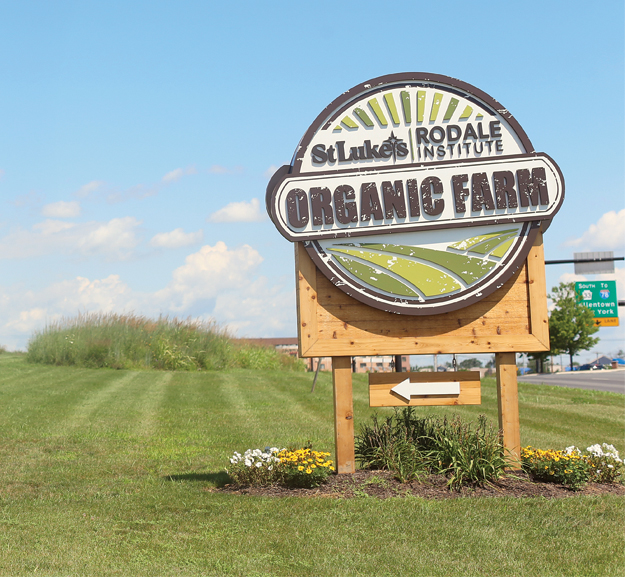
Farm to Hospital
If you've eaten food as a patient or visitor at any St. Luke's University Hospital, you've gotten a taste of organic food at its freshest. The St. Luke's Rodale Institute Organic Farm on the hospital's Anderson campus is home to a ten-acre farm (five acres are actively used to grow more than 30 crops) that provides food for the cafeterias at all six St. Luke's hospitals.
“This was something that was initiated by St. Luke's University Health Network,” says Smallwood. “The president of that campus, Edward Nawrocki, wanted to have a campus that focused on organics. He wanted to have an approach to health and wellness that could utilize the preventative approach.”
Smallwood noted that the old adage of an ounce of prevention being worth a pound of cure often applies to food. Nutritionists at the hospital are proponents of the health benefits of organic food, and partnering with the Rodale Institute seemed like an obvious choice.
“There is no shortage of punch lines about hospital food. As the American public becomes increasingly aware of the connection between the food they eat and human health, they want
to know where their food comes from. If the American health industry can make that connection as well, we'll all be better off,” he says. “We see this as a model for hospitals and other health care professionals to improve their ability to care for their patients through organic agriculture.”
He noted that this farm is now serving as a model for other institutions considering an on-site organic garden or farm.
“Why shouldn't a university have an organic farm on site to supply its cafeteria or meal hall? Why shouldn't a corporate campus have an organic garden on site to supply its cafeteria for lunches?” asks Smallwood. “Farm to school is a concept that is certainly growing in popularity, but why shouldn't all children be eating local, fresh, organic food every day? This is part of our vision for an organic planet. Hyper-local, educational and community building. When you can say, ‘Would you like to see our garden?' on a corporate tour, it's a wonderful thing that brings people together. We can do business, and we can learn and heal people, in a more efficient and healthy way.”
The farm was introduced in 2014 with one full-time farmer, Rodale Institute's Lynn Trizna, and is currently in the process of being certified organic. (A farm must practice organic methods for three growing seasons to be USDA Organic certified.) In addition to growing more than 30 crops, the farm is also home to honeybee hives and Nigerian dwarf goats. The campus has an additional five acres in cover crops, leaving plenty of room for farmers to expand and rotate crops.
Smallwood noted that the hospital's farm also serves as a powerful model for farmers, many of whom must sell their produce to a distributor or struggle to find customers at farmers' markets or through a local CSA. Farmers can now go to other hospitals throughout the country and use St. Luke's farm as an example of what is possible. In turn, farmers will be able to use their knowledge to share healthy foods with an entire community and receive a fair salary for their work.
“Here's a model where we treat this farmer more as a doctor or a teacher. She is paid a salary. She has health benefits,” he explains. “She's not judged by how many onions she grows; she is evaluated like any other professional. This is a great way to raise the farmer to the appropriate level of recognition.”
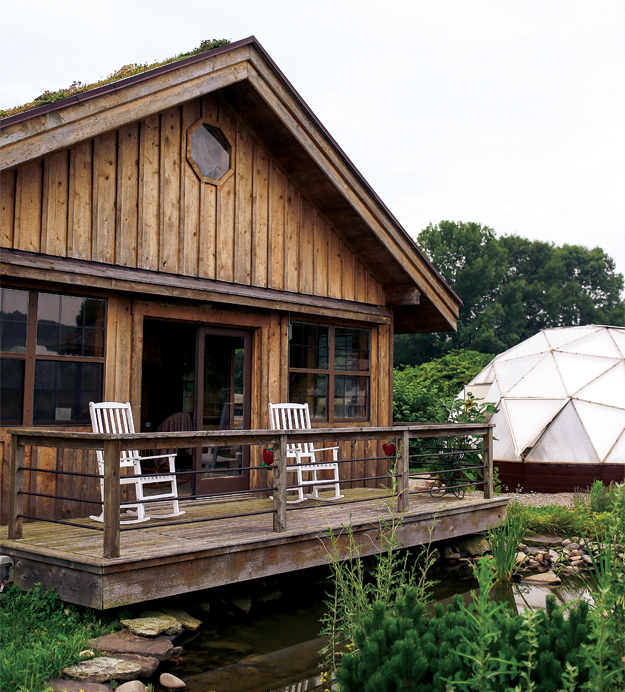
Sharing the Knowledge
No story about the Rodale Institute is complete without mentioning the group's decades-long dedication to researching organic farming methods.
The Rodale Institute was founded in 1947 as a how-to model for farmers, testing and discussing the best methods of compost, crop rotation and organic farming methods. By the 1970s, founder J.I. Rodale's son Robert Rodale realized that the most powerful impact the Institute could have would be through research presented to our nation's political policymakers. He needed a way to prove that organic farming could be just as productive and cost-efficient, if not more so, than conventional farming that utilized pesticides and other synthetic chemicals.
The Rodale Institute thus became the only independent research facility in the nation to develop test sites. In 2014, the Institute marked 34 years of its renowned Farming System Trial, which compares conventional and various organic growing methods side by side.
“It's a myth that organic farming can't feed the world,” says Smallwood. “In the long term, over the course of 30 years, yields were essentially the same.” He noted that organic farming methods often did better than conventional methods, especially in years of drought—even when compared to GMO crops designed to withstand drought conditions.
While we know that organic methods are comparable to conventional, research at the Rodale Institute is helping to discover why this is so and just how intricate nature's balance can be.
For example, we now know that organic crops fare better in drought because healthier, living soil holds more water, and the soil's naturally-occurring bacteria, fungi and other organisms improve nutrition availability.
“Nature has a perfect system. It's all about balance, and nature strikes the perfect balance. The more we interfere, the more problems we create,” explains Smallwood.
While the Institute's Farming System Trial is its longest-running research project, nearly every portion of the Kutztown farm is dedicated to research and training. Their organic apple orchard, open annually to the public for their Organic Apple Festival, began with bare, depleted soil and is now a thriving orchard that exemplifies how farmers can transition to organic methods. A pastured hog facility offers insight into how to raise hogs in an open-air shelter with access to pasture, which cuts back on the cost of feed, reduces the need for antibiotics and leads to healthier, less-stressed animals and higher quality meat products. Researchers are currently tweaking their practices at the hog facility to increase quantity to meet the demand for organic pork without sacrificing quality.
“The term organic comes from looking at the soil as a living, breathing organism,” says Smallwood. “There is a better way, a way to work with nature and encourage biodiversity, most importantly in the soil. Through biodiversity, we achieve natural balance.”
Note: As of September 9, 2015, Jeff Moyer is the new Executive Director of Rodale Institute.
By Stacey Solt | Photography by Alison Conklin


